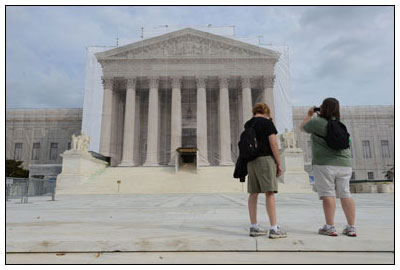US high court considers Fair Credit Act case
By: KIMBERLY ATKINS, BridgeTower Media Newswires//October 4, 2012//
US high court considers Fair Credit Act case
By: KIMBERLY ATKINS, BridgeTower Media Newswires//October 4, 2012//
 The justices of the U.S. Supreme Court will soon decide if the federal government can be sued for damages for violating the Fair Credit Reporting Act.
The justices of the U.S. Supreme Court will soon decide if the federal government can be sued for damages for violating the Fair Credit Reporting Act.
The case of U.S. v. Bormes began when James X. Bormes, an attorney who was filing a lawsuit on behalf of a client in federal court in Illinois, paid the filing fee with a credit card via the online pay.gov system.
After seeing his credit card expiration date displayed in an onscreen confirmation and in an email, Bormes filed a putative class action against the federal government under the FCRA, which prohibits businesses from reproducing credit card expiration dates on receipts.
A district court dismissed the lawsuit on sovereign immunity grounds. Bormes appealed to the Federal Circuit, claiming jurisdiction under the Tucker Act, which generally authorizes monetary claims against the government, as well as under the FCRA.
The Federal Circuit reversed the lower court, holding that the FCRA is a “money- mandating” statute that supports jurisdiction under the Tucker Act.
The Supreme Court granted the government’s petition for certiorari.
The specific and the general
Deputy Solicitor General Sri Srinivasan had barely begun his argument on behalf of the government that neither the FCRA nor the Tucker Act waived governmental immunity when the justices began peppering him with questions.
Justice Sonia M. Sotomayor noted that the statutory language of the FCRA is similar to that of the Fair Labor Standards Act.
“Many courts have held that the FLSA has an express waiver of sovereign immunity,” Sotomayor said. “And many of them have recognized, if not all, a Tucker Act remedy.” Srinivasan suggested that the FLSA jurisprudence was wrong.
“If you apply the framework that we think is the correct one to apply, as we set forth in our brief, you might reach the same conclusion under the Fair Labor Standards Act,” he said.
When Srinivasan was pressed by Justice Elena Kagan on the issue of whether the Tucker Act gives the plaintiff a cause of action even if the FCRA doesn’t, Justice Antonin Scalia jumped in to help him out.
“I assume you are appealing to the textual principle that the specific governs the general,” Scalia said, “that the Tucker Act is a more general provision, and you are saying [it is] overcome by a more specific provision that provides for compensation but excludes the federal government.”
“Were certainly relying on that, Justice Scalia,” Srinivasan said.
Flip that presumption?’
John G. Jacobs, an attorney from Chicago, argued on Bormes’ behalf that, in addition to the language of the law, public policy supports a waiver of immunity.
“In terms of protecting the public, you wouldn’t want to exclude such a large potential defendant as the federal government,” Jacobs said.
Kagan wasn’t sure that was enough.
“The rules are that if [Congress says] nothing at all, the government does retain sovereign immunity,” Kagan said. “You’re asking us to flip that presumption from now on.”
“I don’t believe so, Your Honor,” Jacobs replied. “I think they went out of their way to say [the Tucker Act] applies.”
Scalia seemed unconvinced.
“I haven’t followed this argument,” Scalia said. “You say [the statute] shows that they had liability by the government in mind? … If you are right about that, I guess we could write a very narrow opinion saying the Tucker Act applies where there is a cause of action under the original statute anyway, in which case we would not have made much new law, would we?”
“I’m hoping we won’t make much new law, Your Honor,” Jacobs said.
A decision from the Court is expected later in the term.
Legal News
- Milwaukee drops security personnel ordinance
- Wisconsin Supreme Court tacks on additional months to already suspended lawyer
- Supreme Court: Abortion protester’s First Amendment rights violated
- These doctors were censured. Wisconsin’s prisons hired them anyway
- Ruling reinstates lawsuit over ‘Black Lives Matter’ school posters
- Wisconsin Supreme Court to consider whether 175-year-old law bans abortion
- Wisconsin man facing bestiality and felony bail jumping charges
- Waukesha County woman indicted in National Health Care Fraud Law Enforcement Action
- Man sentenced to 15 months for fraud involving luxury vehicles
- Wisconsin Department of Justice Fire Marshal investigating fire that killed six
- Ozaukee County first responders save family of three, father and son on Milwaukee River
- Supreme Court sends Trump immunity case back to lower court, dimming chance of trial before election
Case Digests
- Termination of Parental Rights
- First Amendment Rights
- Termination of Parental Rights
- Late Filing
- Real Estate-Attorney Fees
- Ineffective Assistance of Counsel
- Variance-Interpretation of Zoning Ordinances
- Sentencing
- Fourteenth Amendment’s Due Process Clause-Jury Instructions
- Unlawful Collection Practices-Evidence
- Sentencing-Vindictiveness
- Prisoner Grievances-Exhaustion of Administrative Remedies











